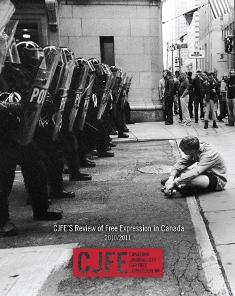For the second year in a row, the Harper government has received a failing grade from CJFE in its Report Card on the state of freedom of expression in Canada.
(CJFE/IFEX) – Toronto, May 9 2011 – For the second year in a row, the Harper government has received a failing grade from Canadian Journalists for Free Expression in its Report Card on the state of freedom of expression in Canada. The Report Card, featured in the new edition of CJFE’s Review of Free Expression in Canada, says government secrecy has worsened in the past 12 months; there are longer delays in responding to information requests and there is a dramatic decline in requestors receiving all the information they requested.
CJFE’s Report Card also gives a failing grade to both the federal government and security services for harassment, failure to respect media credentials, and detention of journalists and others during the G20 Summit in the summer of 2010.
“Access to government information is not working for Canadian citizens – and it’s gotten worse under the Harper government,” says CJFE Board member and journalist Bob Carty. “We hope that now, with this majority, the prime minister will finally act to fulfill all of his 2006 election promises to reform free access to information and once again make Canada a world-class, open, transparent country.”
Report Card grades include:
> F- for the Harper government for longer delays in responding to information requests, releasing less information, for politicizing the access system with attempts to “unrelease” documents already released, and for being in contempt of Parliament for failing to provide information on spending programs.
> F for the security services and the federal government for calling the G20 Summit in Toronto an “unmitigated success” when in fact it was the most massive compromise of civil liberties in Canadian history. This debacle included repeated refusals to recognize the credentials of journalists, and multiple incidents of journalist harassment and detention.
> C for the Supreme Court of Canada for a mixed legal decision, forcing one journalist to turn his source material over but at the same time recognizing that a right to protect sources exists where the media can show it is in the public interest.
Other articles in the Review include:
* A summary of all significant legal cases regarding free expression.
* Analysis of what went wrong for journalists’ rights at the G20 Summit, and a look forward at a landmark hate speech case.
* Several perspectives on the state of whistleblowing, including the positive aspects of the WikiLeaks dumps, the continuing lack of protection for whistleblowers in Canada, and why we should be more like Iceland.
* Canada’s Free Expression INDEX, which highlights some of the stats and facts from 2010/11. Here’s just one example: Number of words and phrases trademarked by the organizing committee of the 2010 Olympics, preventing their use without permission, from December 2007 to December 2010: 17.



